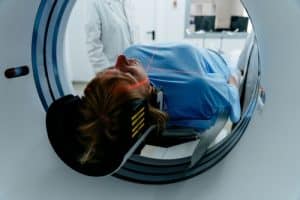Magnetic Resonance Imaging (MRI) is a remarkable medical technology that has revolutionized the field of diagnostics. However, like many advanced technologies, it has been surrounded by myths and misconceptions that can lead to unnecessary anxiety. In this blog post, we’ll dive deep into some of the most common MRI myths. Let’s separate fact from fiction and ensure that you clearly understand what to expect when undergoing an MRI scan.

Myth 1: MRI Scans Emit Harmful Radiation
One of the most pervasive myths about MRI scans is that they expose patients to harmful radiation. However, the truth is quite the opposite. Unlike X-rays and CT scans, which use ionizing radiation, MRI scans rely on powerful magnetic fields and radio waves to create detailed images of the body’s internal structures. This means there is no exposure to ionizing radiation, making it a safe and non-invasive imaging option.
Myth 2: It is Painful
The idea of being inside a confined space can lead people to believe that MRI scans are painful or claustrophobic. While it’s true that some individuals might experience mild discomfort due to the confined space, modern machines come in various designs. For example, some clinics include large-bore MRI scanners, which offer a more spacious and comfortable environment. Additionally, the procedure itself is painless, and your technologist will ensure your comfort throughout the scan.
Myth 3: MRI Scans Are Only for Serious Health Issues
It’s a common misconception that MRI scans are reserved for diagnosing serious health conditions. But, it is a versatile imaging tool that can provide detailed insights into a wide range of health concerns. It can detect sports injuries to assess joint health and evaluate brain function. Whether you’re experiencing minor discomfort or seeking preventive care, MRI scans can play a crucial role in maintaining your overall well-being.
Myth 4: Metal Implants Are a Barrier
The belief that metal implants like pacemakers or joint replacements prevent MRI scans is a misconception. While some metal implants can interfere with the magnetic field, many modern machines are equipped to accommodate patients with certain types of implants. It’s essential to inform your healthcare provider and technologist about any metal implants you have before the scan so they can determine the best course of action.
Myth 5: The Scans Are Only for Adults
Contrary to this myth, MRI scans are safe and effective for individuals of all ages, including children and infants. Pediatric protocols are specially designed to accommodate the unique needs and sensitivities of younger patients. If your child requires an MRI scan, the medical staff will ensure a comfortable experience, potentially even allowing a parent to be present during the procedure for added reassurance.
Myth 6: MRI Scans Are Quick to Diagnose Everything
While MRI scans are incredibly powerful diagnostic tools, they are not a one-size-fits-all solution for every health concern. The type of condition being assessed, the body part being scanned, and the required image quality can influence the duration of the scan. Some scans may take as little as 15 minutes, while others could extend to an hour or more. Our Whole Body MRI scan takes around 2420+ images of the entire body for precise and comprehensive health analysis. The goal is to obtain accurate and detailed images, so patience during the process is crucial.
Myth 7: You’ll Feel the Magnetic Pull During the Scan
The notion that you’ll feel a strong magnetic pull or attraction during an MRI scan is a common misconception fueled by sensationalized portrayals in movies and TV shows. In reality, the magnetic field is powerful but localized to the scanning area. You won’t feel any physical sensation related to the magnetic force. Your role during the scan is to lie still and relax, as movement can affect image quality.
Myth 8: The MRI Is Not Suitable for Claustrophobic Individuals
Claustrophobia, or the fear of confined spaces, is a legitimate concern for some individuals considering an MRI scan. However, advancements in MRI technology have led to the development of large-bore scanners, which offer a more spacious and less confining environment. Additionally, your technologist can provide comfort measures, such as playing calming music or using relaxation techniques, to help you manage any anxiety during the scan.
You can always ask your doctor for an anxiety or sedative prescription for the scan. For more details, check our FAQs.
Myth 9: You Can Eat and Drink Normally Before Your Scan
Contrary to this myth, some MRI scans may require you to avoid eating and drinking 4-5 hours before your scan. This is particularly true for abdominal or pelvic scans that might require an empty stomach for optimal imaging. It’s important to follow any pre-scan instructions provided by your healthcare provider or the imaging facility to ensure accurate results and a smooth experience.
Misinformation and misconceptions can cause unnecessary stress and anxiety, especially when it comes to medical techniques like MRI scans. Our passionate team is committed to dispelling these myths and providing you with accurate information, empowering you to approach your experience with confidence and peace of mind. We believe that open communication with your healthcare provider and technologist is key to ensuring a seamless and stress-free scan. If you have any doubts or questions, please don’t hesitate to reach out to us – your health and well-being are our top priorities. Let us guide you through this process and help you achieve optimal results.
Now you have all your doubts resolved, it’s time to take the first step and Book your scan now!





